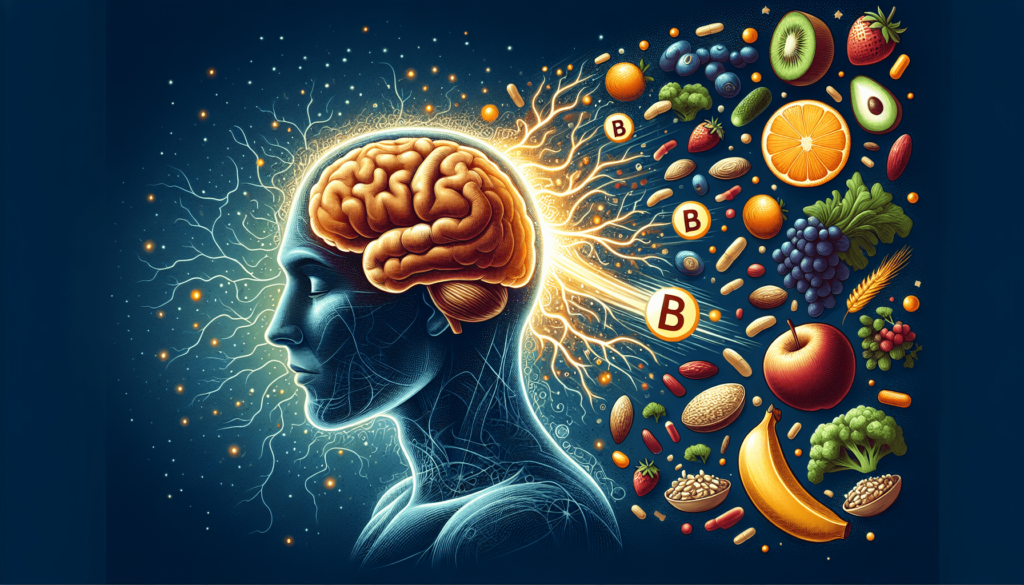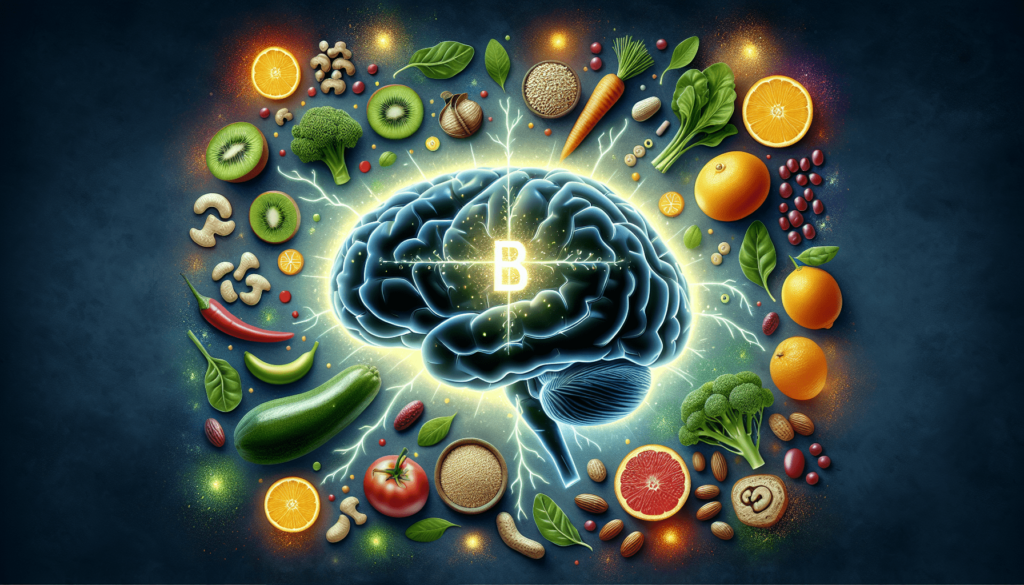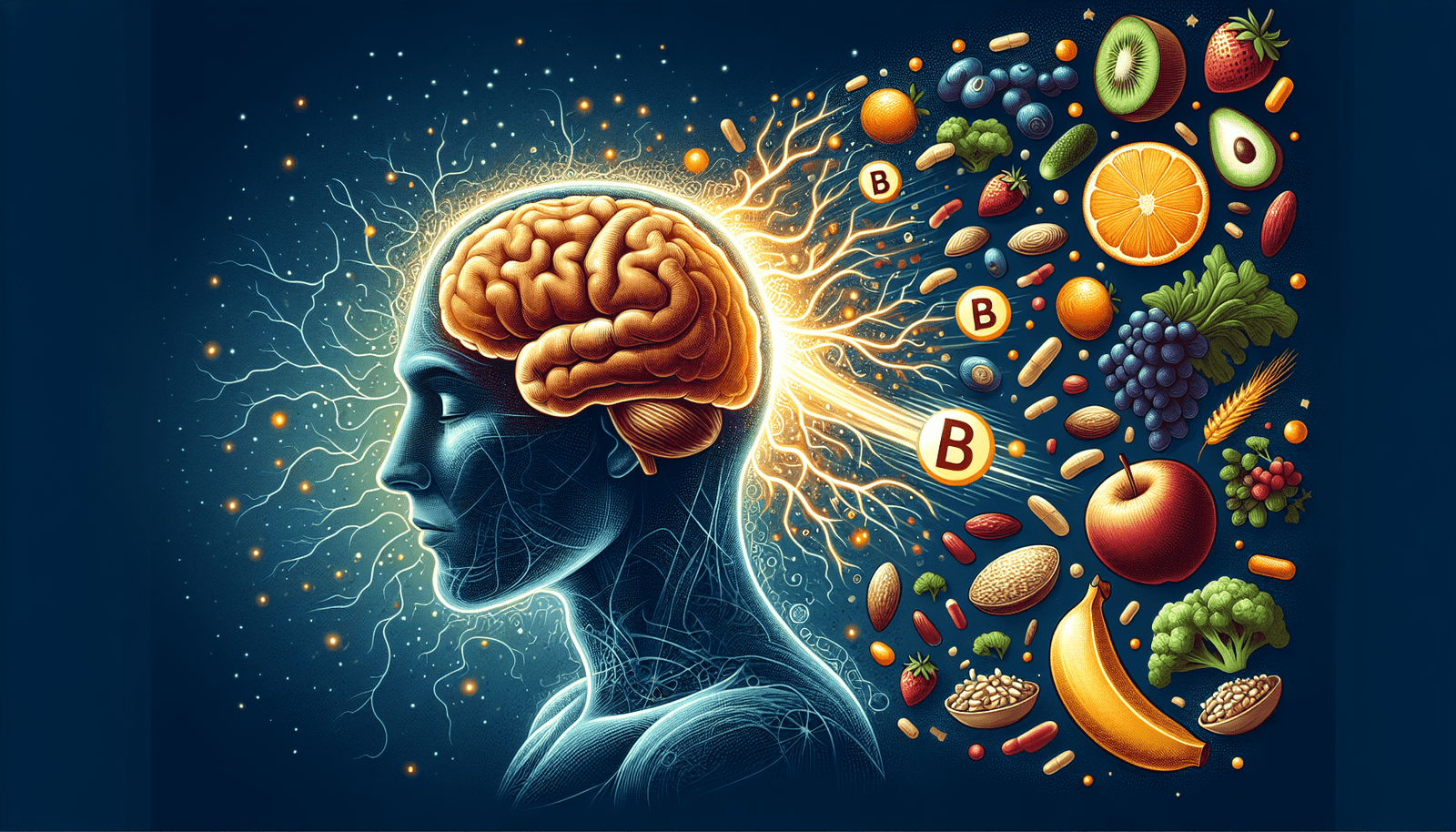You’ll be amazed by the incredible impact that B vitamins can have on your brain health. From boosting memory and cognition to enhancing your mood and reducing stress, these essential nutrients play a vital role in keeping your brain sharp and functioning at its best. In this article, we’ll explore the importance of B vitamins in brain health and uncover how incorporating them into your diet can lead to a happier, healthier mind. So, grab a cup of tea, sit back, and get ready to discover the power of B vitamins for your brain.

What Are B Vitamins?
B vitamins overview
B vitamins are a group of water-soluble vitamins that play a crucial role in maintaining the health and proper functioning of the human body. There are eight different types of B vitamins, each with its unique functions and benefits. These vitamins are essential for converting food into energy, supporting brain function, promoting nervous system health, and maintaining healthy skin, hair, and eyes.
Different types of B vitamins
The B vitamin complex consists of eight vitamins, namely thiamine (B1), riboflavin (B2), niacin (B3), pantothenic acid (B5), pyridoxine (B6), biotin (B7), folate (B9), and cobalamin (B12). Each B vitamin has its specific role in the body, but they often work together synergistically to support overall health and well-being.
Importance of B Vitamins in Brain Health
Brain function and health
The human brain is responsible for controlling our thoughts, emotions, behaviors, and cognitive abilities. It requires a constant supply of nutrients to function optimally. B vitamins are involved in a wide range of processes crucial for brain health, such as neurotransmitter synthesis, DNA repair, energy production, and the maintenance of the myelin sheath that protects nerve cells.
B vitamins and cognitive function
Cognitive function refers to our ability to think, learn, remember, and make decisions. Several B vitamins, including thiamine, riboflavin, niacin, pyridoxine, biotin, and cobalamin, have been linked to cognitive function. These vitamins support the production and regulation of neurotransmitters, which are essential for communication between brain cells. Adequate intake of B vitamins is vital for maintaining optimal cognitive function throughout life.
B vitamins and mental health
Research suggests that B vitamins may also have a significant impact on mental health. Deficiencies in certain B vitamins, such as folate and cobalamin, have been associated with an increased risk of depression and other mood disorders. B vitamins are involved in the synthesis of neurotransmitters like serotonin, dopamine, and norepinephrine, which play a crucial role in regulating mood and emotions.
B Vitamins and Brain Development
B vitamins during pregnancy
During pregnancy, B vitamins play a vital role in the development of the fetal brain and nervous system. Adequate intake of folate, in particular, is crucial in the early stages of pregnancy, as it helps prevent neural tube defects, such as spina bifida. Other B vitamins, such as thiamine and cobalamin, are also important for optimal fetal brain development.
B vitamins in childhood and adolescence
B vitamins continue to be essential for brain health and development during childhood and adolescence. Proper intake of B vitamins supports cognitive function, learning, and memory in children and teenagers. These vitamins are involved in the production and regulation of neurotransmitters, which are crucial for healthy brain function and optimal cognitive performance during these critical stages of life.
B Vitamins and Neurological Disorders
B vitamins and Alzheimer’s disease
Alzheimer’s disease is a progressive neurological disorder characterized by memory loss, cognitive decline, and behavioral changes. While the exact causes of Alzheimer’s disease are not fully understood, research suggests that certain B vitamins may play a role in its prevention and management. For example, studies have shown that high-dose supplementation with B vitamins, including folate, vitamin B6, and vitamin B12, can slow the progression of cognitive decline in individuals with mild cognitive impairment and reduce the risk of developing Alzheimer’s disease.
B vitamins and Parkinson’s disease
Parkinson’s disease is a degenerative disorder that affects the nervous system and motor function. While B vitamins alone cannot prevent or cure Parkinson’s disease, they may play a role in its management. Research indicates that individuals with Parkinson’s disease often have lower levels of certain B vitamins, such as riboflavin and niacin. Supplementation with these vitamins, along with a balanced diet, may help support overall brain health and improve symptoms in some patients.
B vitamins and depression
Depression is a common mental health condition characterized by persistent feelings of sadness, hopelessness, and a loss of interest in activities. B vitamins, particularly folate, cobalamin, and pyridoxine, have been studied for their potential role in improving symptoms of depression. These vitamins are involved in the production of neurotransmitters like serotonin and dopamine, which are known to play a crucial role in regulating mood. While more research is needed, some studies suggest that B vitamin supplementation may have a positive impact on depression symptoms, particularly in individuals with deficiencies.

B Vitamins as Antioxidants
Role of antioxidants in brain health
Antioxidants are compounds that help protect our cells from oxidative damage caused by free radicals. Oxidative stress in the brain has been linked to various neurodegenerative disorders, including Alzheimer’s disease and Parkinson’s disease. Antioxidants play a crucial role in neutralizing free radicals and reducing oxidative stress, thus promoting brain health and protecting against age-related cognitive decline.
B vitamins as antioxidants
While B vitamins are primarily known for their role in energy production and nervous system function, some of them also possess antioxidant properties. For example, vitamins B6, B9 (folate), and B12 have been shown to help reduce oxidative stress and protect against neurodegenerative damage in the brain. Including B vitamin-rich foods in your diet can be a valuable strategy to support brain health and reduce the risk of age-related cognitive decline.
Food Sources of B Vitamins
B vitamins in animal-based foods
Animal-based foods are rich sources of B vitamins. For example, lean meats, such as beef, turkey, and chicken, are excellent sources of vitamins B3, B6, and B12. Fish, especially salmon and trout, are abundant in vitamins B6 and B12. Eggs and dairy products are also good sources of multiple B vitamins, including riboflavin, biotin, and cobalamin.
B vitamins in plant-based foods
Plant-based foods also provide various B vitamins, although in different quantities compared to animal-based foods. Whole grains, such as brown rice, quinoa, and oats, are rich in vitamins B1, B3, and B5. Legumes, including lentils, beans, and chickpeas, are excellent sources of folate and vitamins B5 and B6. Green leafy vegetables, such as spinach and kale, are particularly high in folate and vitamin B9. Additionally, nuts and seeds, such as almonds and sunflower seeds, provide various B vitamins, including biotin and niacin.
Supplements and B Vitamin Deficiency
When to consider B vitamin supplements
In most cases, it is possible to obtain adequate amounts of B vitamins through a balanced diet. However, certain individuals may require B vitamin supplements to meet their nutritional needs. Vegetarians and vegans, for example, may find it beneficial to supplement with vitamin B12, as plant-based foods are usually poor sources of this vitamin. Pregnant women may also require additional folate supplementation to support proper fetal development and prevent neural tube defects. Additionally, individuals with certain medical conditions or malabsorption issues may benefit from B vitamin supplementation under the guidance of a healthcare professional.
Common signs of B vitamin deficiency
B vitamin deficiencies can lead to various health problems, including those related to brain function. Some common signs of B vitamin deficiency include fatigue, weakness, irritability, poor concentration, memory problems, mood disturbances, and neurological symptoms like numbness or tingling in the hands and feet. If you experience any of these symptoms, it is recommended to consult with a healthcare professional who can assess your B vitamin status and provide appropriate recommendations.
Recommended Daily Intake of B Vitamins
B vitamin RDA for adults
The recommended daily intake (RDA) of B vitamins varies depending on age, sex, and overall health. In general, adults should aim to consume the following amounts of B vitamins each day:
- Thiamine (B1): 1.1-1.2 milligrams (mg)
- Riboflavin (B2): 1.1-1.3 mg
- Niacin (B3): 14-16 mg
- Pantothenic acid (B5): 5 mg
- Pyridoxine (B6): 1.3-1.7 mg
- Biotin (B7): 30 micrograms (mcg)
- Folate (B9): 400-600 mcg
- Cobalamin (B12): 2.4-2.8 mcg
It is important to note that these recommendations can vary depending on individual needs, so consulting with a healthcare professional or registered dietitian is advisable to determine the appropriate B vitamin intake for your specific circumstances.
B vitamin RDA during pregnancy and lactation
During pregnancy and lactation, the recommended daily intake of B vitamins may increase to support the needs of both the mother and the growing baby. The specific requirements can vary, but generally, the following RDA ranges apply:
- Thiamine (B1): 1.4-1.5 mg
- Riboflavin (B2): 1.4-1.6 mg
- Niacin (B3): 18-20 mg
- Pantothenic acid (B5): 6 mg
- Pyridoxine (B6): 1.9-2.0 mg
- Biotin (B7): 30-35 mcg
- Folate (B9): 600-800 mcg
- Cobalamin (B12): 2.6-2.8 mcg
Pregnant and lactating women should consult with their healthcare providers regarding their specific B vitamin needs, as individual circumstances may require higher or lower intakes.
Potential Risks and Side Effects of B Vitamins
Possible risks of excessive B vitamin intake
While B vitamins are generally considered safe when consumed in appropriate amounts, excessive intake of certain B vitamins can have adverse effects. For example, high doses of vitamin B3 (niacin) can cause flushing of the skin, itching, and digestive disturbances. Overconsumption of vitamin B6 (pyridoxine) can lead to nerve damage and sensory neuropathy. It is important to follow recommended guidelines and avoid excessive supplementation of B vitamins without guidance from a healthcare professional.
Interactions with medications
Some medications may interact with B vitamins, and this can affect their absorption, effectiveness, or metabolism in the body. For instance, certain antiepileptic drugs and proton pump inhibitors may interfere with the absorption of vitamin B12. It is always advisable to inform your healthcare provider about any medications you are taking and discuss any potential interactions with B vitamins.
Conclusion
The role of B vitamins in brain health is vital and encompasses various aspects, ranging from supporting brain function and cognitive abilities to promoting brain development and reducing the risk of neurological disorders. By ensuring adequate intake of B vitamins through a balanced diet or appropriate supplementation, individuals can optimize their brain health and cognitive well-being throughout life. Remember to consult with a healthcare professional or registered dietitian to determine your specific B vitamin needs and make the necessary adjustments to maintain a balanced diet for optimal brain function.

